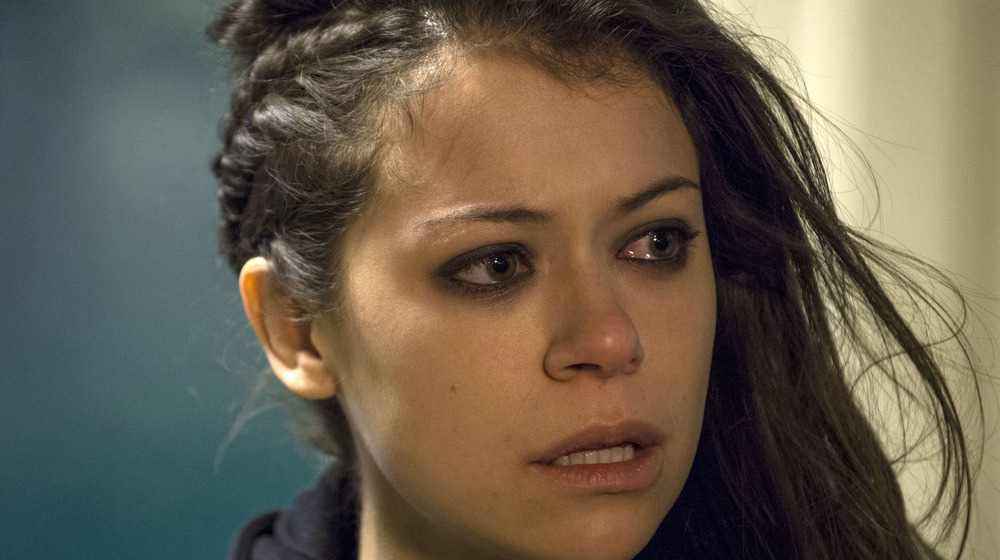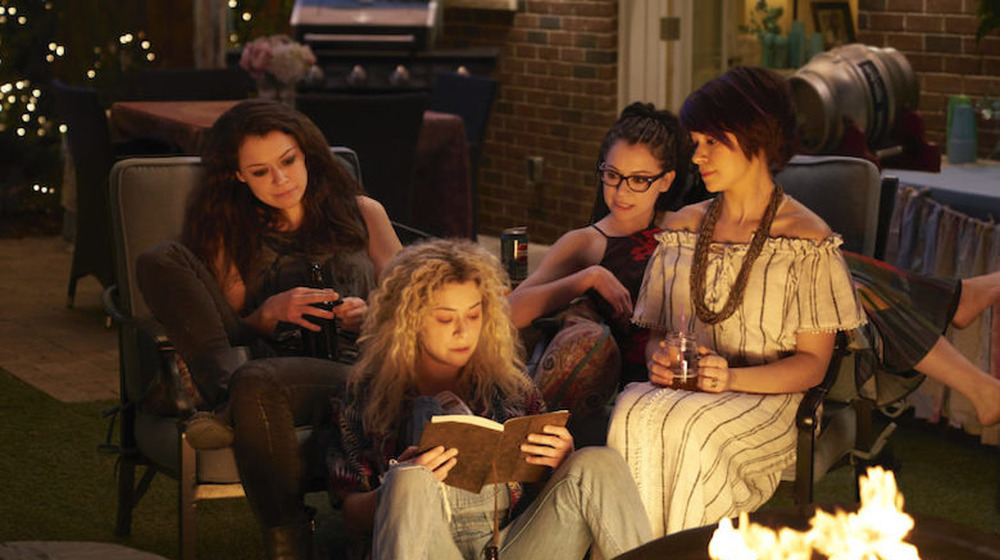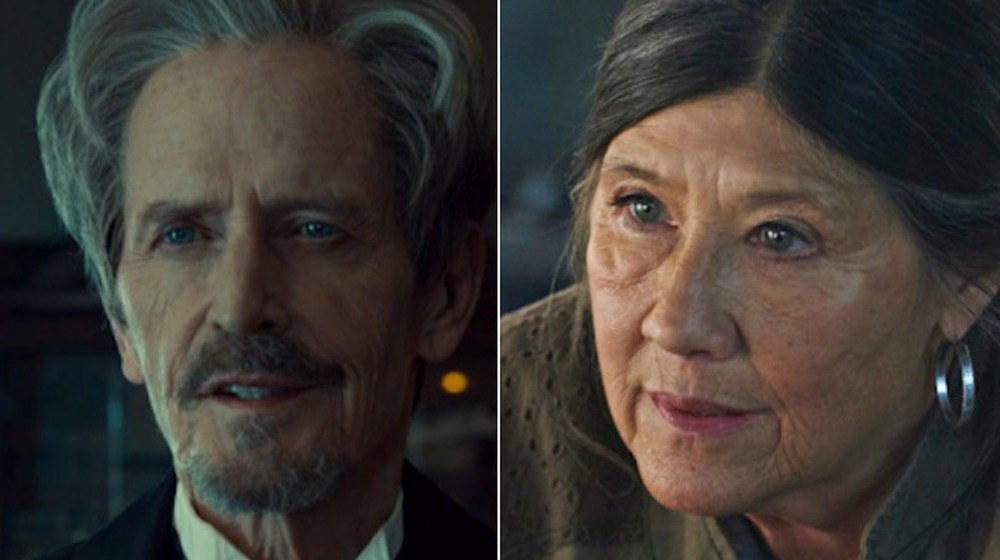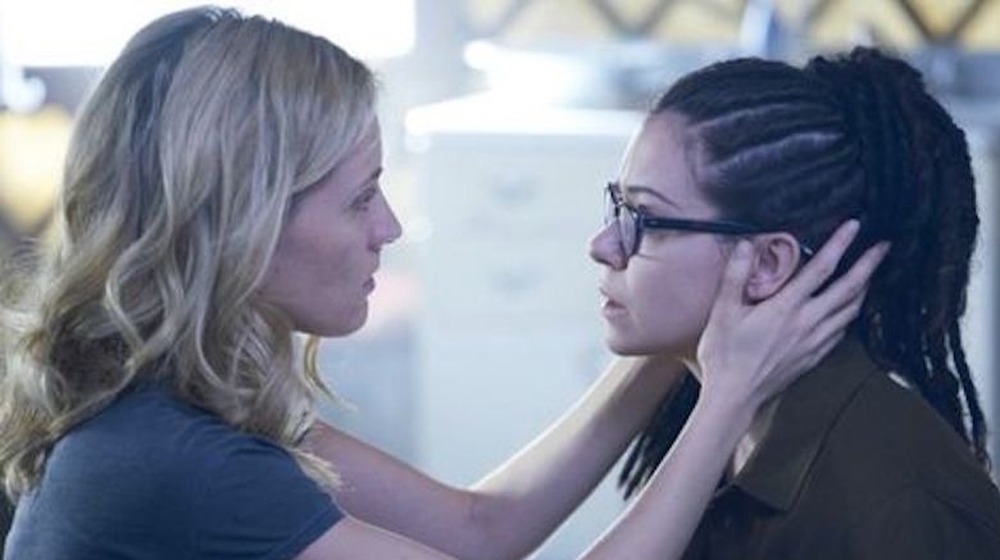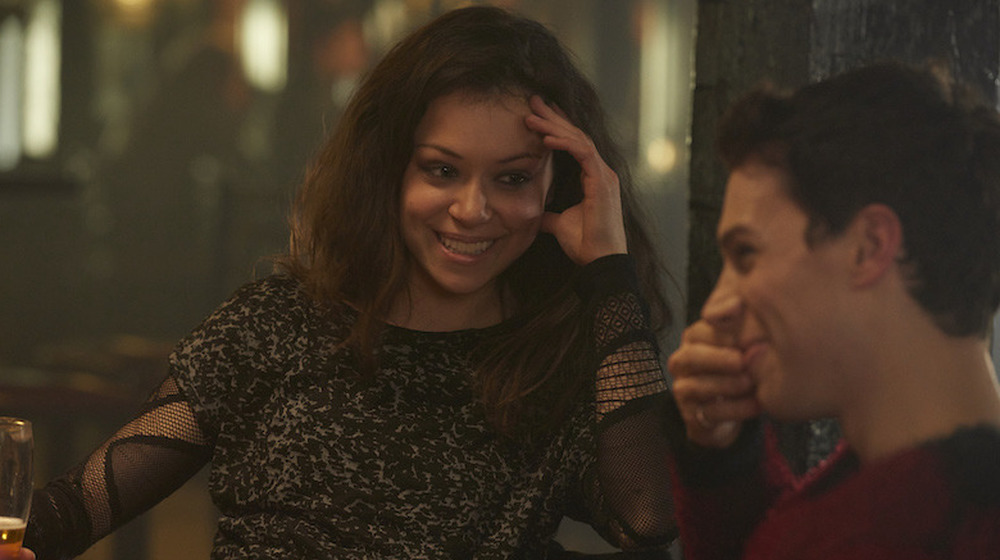The Ending Of Orphan Black Explained
After five seasons of clone conspiracies, Orphan Black finally came to a close in 2017. Although it wasn't the biggest show on television over its four year run, it achieved something many projects don't in being able to tell its full story. What's even more surprising is that after 50 episodes, the writers still managed to give all the main clones a happy ending — well, aside from M.K. of course. Did anyone else actually get over her brutal death at the start of season 5 or is it just us?
Anyway, what started with Sarah Manning (the inimitable Tatiana Maslany) witnessing Beth Childs' suicide, quickly grew into a larger story about the importance of human life and individuality. The series has always worn its heart on its sleeve, and that was never more clear than within the touching finale, which finally put a stop to the nefarious Dyad Institute that had been hunting the clones for so long. But with so many individual character arcs to pay off, it was easy to get a little lost in where all the Leda sisters ended up by the time the credits rolled.
The Clone Club
Audiences witnessed this sci-fi adventure mainly through the eyes of Sarah Manning for the last four years, but after living such an emotionally tortured existence, she eventually finds her inner peace. Thanks to the help of her sestras, Sarah had toppled the Dyad Institute, saved her daughter Kira, and put an end to the company's clone witch hunt.
Another clone also got the chance to be a mother; Helena. The unhinged but oh-so-lovable Ukrainian clone gave birth in a Dyad basement after Sarah and Arthur rescued her from the clutches of Dr. Coady and P.T. Westmoreland. Thankfully, she didn't name the babies 'Orange' and 'Purple' like she'd promised. Instead Helena names them after Art and Donnie, because they're the best men she knows. We're not crying, promise.
And as she's surrounded by Alison, Cosima, Sarah and even Felix (but we'll get to him in a moment) Helena reveals what she's been working on — a novel titled, you guessed it, Orphan Black. Sarah's story ends in a truly touching moment as she, Felix and Kira leave for a day at the beach. Just as she's about to step outside, she takes one last look at her house — clearly feeling content for the first time in years. At its core, Orphan Black has always looked at the importance of forging your own family alongside what it means to be a mother in non-traditional circumstances.
P.T. Westmoreland and Dr. Coady
Most audiences assumed that P.T. Westmoreland was going to wind up being a myth in the Orphan Black world, since we didn't see the man behind the curtain until season 5. The villain claimed he was 107 years old before ultimately being outed as a fraud who had simply taken up the Westmoreland mantle. Thankfully everyone's favorite member of Clone Club, Sarah, caved his head in with a fire extinguisher in the finale after Fakemoreland attacked her at Dyad. It was pretty cathartic seeing her scream "shut up!" as she did it too. To be fair, calling someone a lab rat is rude.
Are we all in agreement that Dr. Virginia Coady was a complete sociopath? The creator of the Castor clones consistently showed no remorse for all the lives she's destroyed over the years. Remember how she tested the Castor disease by getting them to sexually-transmit their protein defect to women, to see how it would render them infertile? Coady's entire arc just highlights Orphan Black's warning about ethics and the loss of humanity. Helena jamming a screwdriver in Coady's throat is the least she deserves, let's be honest.
274 Ledas later
Obviously, the finale is the end of Orphan Black on TV. But, like that big blue guy from Watchmen says, "nothing ever ends." Because when Felix turns up at the baby shower for Art and Donnie, he comes bearing a game-changing gift from Rachel Duncan herself. What? A main villain giving out presents? It seems she's had a change of heart since losing her eye and all the wealth and power that came from her position at Dyad before it fell.
Rachel gives Felix a folder containing all the names, locations, and contact information of the other Leda clones across the world — all 274 of them. It looks like it's time for Cosima and Delphine to take a gap year traveling, because now they're on a mission to find all 274 clones and cure them of their auto-immune disorder. The show sees the couple in Colombia on the first leg of their journey, but who knows where they'll head next? That would be a perfect spinoff show...
Orphan Black: The Next Chapter
After years of fighting oppression and questioning the boundaries of science and religion, Orphan Black comes to a close on such a happy note, it would seem a shame to hurl the Clone Club into a life of turmoil in a follow-up or spin-off series. But it also seems a shame to leave these characters behind, especially after Tatiana Maslany's frankly jaw-dropping performance as each new personality. The show's creators, John Fawcett and Graeme Manson, explained to The Hollywood Reporter in 2017 that a spin-off or movie adaptation would have to follow an idea truly fascinating instead of just more clone conspiracies.
It was announced in 2019 that an Orphan Black spinoff was in the works and set in the same world as the main series, but there's been no word since about its progress. But life's still not over for the Clone Club! There's also an audiobook aptly titled, Orphan Black: The Next Chapter available on Serial Box, with most of the cast reprising their roles following a time jump to 2022. Whether or not we'll see Sarah, Helena, Alison and Cosima in live-action again remains to be seen, but for now we're just happy the main group actually got a happy ending. It won't be long until we next see Tatiana Maslany on TV though, as she'll soon join the Marvel Cinematic Universe as Jennifer Walters, A.K.A. She-Hulk.
